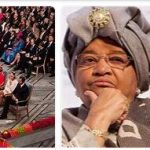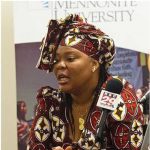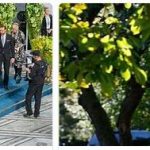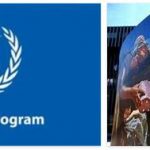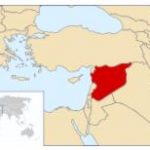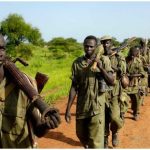7: Yemen in Transformation – Tawakkol Karman
The Arab Spring of 2011 brought Arab countries to the headlines in newspapers all over the world. People rose up against dictatorship and oppression; they demanded democracy, human rights and better living conditions.
In Yemen, President Ali Abdullah Saleh had our president for 33 years, first in northern Yemen, then in the same country from 1999. The country was considered a “budding democracy”, and Saleh was elected in 2006 in an election with cheating, elected and violations of press freedom.
Tawakkol Karman was born in 1979, studied trade and political science at the University of Sanaa, married and had three children. She worked as a journalist, and together with colleagues she started in 2005 the organization Women Journalists Without Chains . They wanted to work for freedom of expression and fundamental rights. Karman bravely reported on human rights abuses, and in 2007 she began organizing peaceful demonstrations every week against corruption in government, for the release of political prisoners, for a democratic and secular state and rights for women.
Karman was arrested and nicknamed ” Mother of the Revolution». She is a member of the leading Islamist opposition party in Yemen, but is not affiliated with the conservative wing of the party when it comes to women’s rights. Among other things, she does not wear a face-covering niqab, like most Yemeni women, but wears a headscarf. The protests against the regime are rented from a tent camp in the center of the capital.
Tawakkol Karman is the first Arab woman and the second Muslim to receive the Nobel Peace Prize, and she is the youngest ever to receive the award.
8: Women’s role in peace work
It took a long time before women were perceived as anything other than victims of armed conflict. But there was a breakthrough in 2000, when the UN Security Council adopted Resolution 1325 on women, peace and security. The Nobel Committee now refers to the resolution, but it is far from certain that women will become actors on an equal footing with men in peace processes and peace work in general.
Resolution 1325 from the Security Council in the UN (the rest is taken from fn1325.no , which quotes from Resolution 1325)
Resolution 1325 on women, peace and security aims to increase women’s participation and influence in the work of preventing, managing and resolving conflicts. The resolution will also contribute to safeguarding women’s human rights during flight, in war and conflict and integrate the gender perspective in peace-building work.
With Resolution 1325 in 2000, for the first time in the history of the UN, the Security Council took a position on issues concerning the role and experiences of women in armed
conflict.
The Security Council …
- refers to several previous resolutions: 1261 (1999), 1265 (1999), Nos. 1296 (2000) and 1314 (2000), in addition to statements by the President of the Council and to the President’s statement to the press on International Women’s Day 8 March 2000 (SC / 6816),
- refers to the commitments under the Beijing Declaration and Program of Action (A / 52/231), and in the final document of the 23rd Special Session (Women 2000: Equality, Development and Peace for the 21st Century), in particular on women and armed conflict ,
- Recalls the purpose and principles of the UN Charter and the main responsibility of the Security Council under the Charter for the maintenance of international peace and security;
- Expresses its concern that civilians, especially women and children, make up the vast majority of those affected by armed conflict,g. as refugees and internally displaced persons, and who are increasingly falling victim to combatants and other armed groups, and recognizing the consequences of this for lasting peace and security, and that the Council’s role must be strengthened through decisions that can prevent and resolve conflicts
- Reaffirms the important role of women in preventing and resolving conflicts and building peace, and emphasizes the importance of women participating equally and being fully involved in all measures to maintain and promote peace and security, and that women must participate more in decision-making processes for conflict prevention and resolution
- also reaffirms the need to fully implement international humanitarian law and international law provisions that protect women’s and girls’ rights during and after conflicts;
- emphasizes that all parties ensure that demining and mine awareness programs take into account the special needs of women and girls;
- Recognizes the urgent need to integrate a women’s perspective into peacekeeping operations;
- also recognizes that understanding of how armed conflict affects women and girls, and that effective institutional arrangements to guarantee them protection and full participation in the peace process will make a significant contribution to maintaining and promoting peace and security;
- points to the need for better data on the effects of armed conflict on women and girls.

